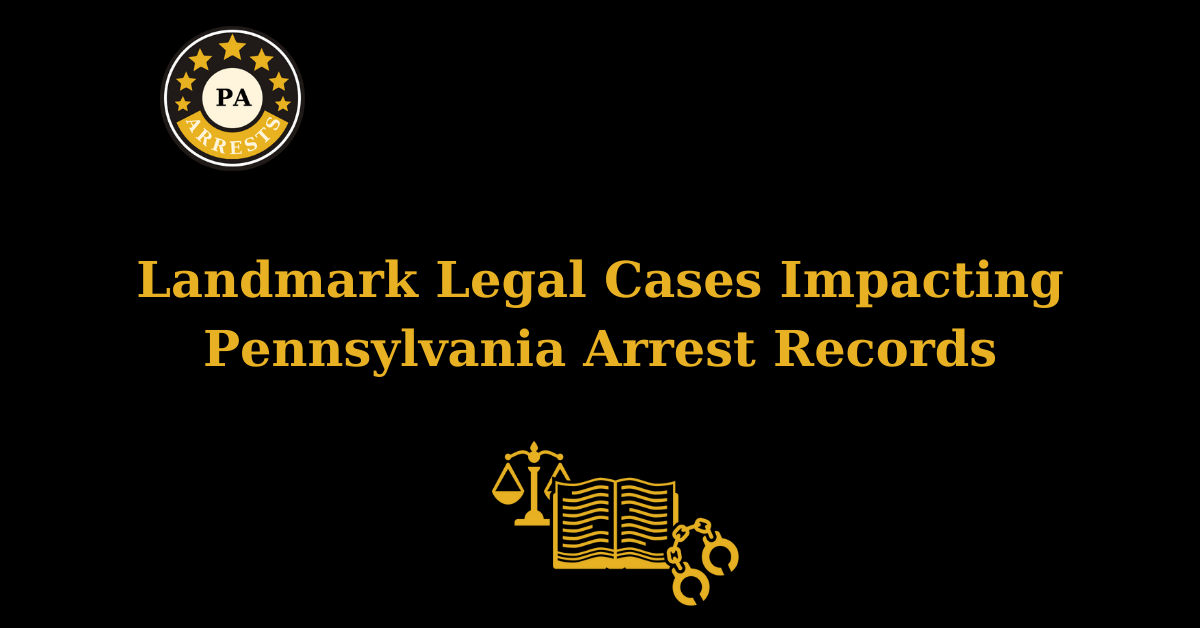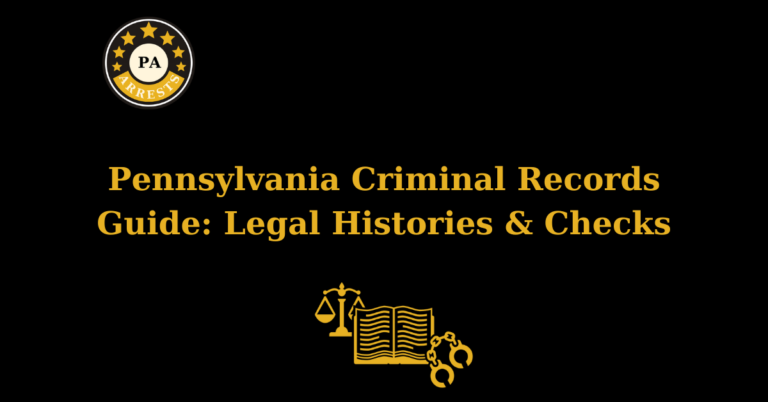Landmark Legal Cases Impacting Pennsylvania Arrest Records

In the vast landscape of legal history, there are certain cases that stand out as pivotal moments, shaping the very foundations of our criminal justice system. These landmark cases have left an indelible mark on Pennsylvania’s arrest records, setting precedents and influencing how law enforcement operates to this day.
From the groundbreaking Miranda v. Arizona case, which established the rights of individuals when being arrested, to the landmark Gideon v. Wainwright case, which ensured the right to legal counsel for all defendants, these court decisions have transformed the way arrests are conducted and how suspects are treated within our state.
The Impact of Landmark Cases on Pennsylvania’s Criminal Justice System
Throughout history, certain legal cases have emerged as game-changers, leaving an indelible mark on Pennsylvania’s arrest records and shaping the very foundations of our criminal justice system. These landmark cases have set important precedents and continue to influence the way law enforcement operates today.
Miranda v. Arizona: Protecting Individual Rights
One of the most groundbreaking cases in legal history, Miranda v. Arizona, played a pivotal role in ensuring the protection of individual rights during arrests. This landmark decision established the now-famous “Miranda Rights,” which guarantee that suspects must be informed of their right to remain silent and their right to legal counsel. The impact of this case cannot be overstated, as its principles have become firmly ingrained in our criminal justice system.
Gideon v. Wainwright: Ensuring Access to Legal Counsel
In the landmark case of Gideon v. Wainwright, the Supreme Court ruled that every defendant, regardless of their financial situation, has the constitutional right to legal counsel. This decision revolutionized the way arrests are conducted and significantly improved the fairness of our criminal justice system. It ensured that even the most vulnerable individuals have access to competent legal representation, preventing wrongful convictions and promoting a more just society.
Terry v. Ohio: Balancing Police Power and Individual Rights
Terry v. Ohio is another landmark case that has had a profound impact on Pennsylvania’s arrest records. This decision authorized police officers to conduct brief, warrantless searches, known as “stop and frisks,” if they have reasonable suspicion that a person is involved in criminal activity. While this case expanded police powers, it also raised important questions about the balance between law enforcement’s authority and individual rights. The outcome of Terry v. Ohio continues to shape the way arrests are conducted and the boundaries of police power in our state.
Escobedo v. Illinois: Safeguarding the Right to Legal Counsel
Escobedo v. Illinois was a landmark case that further solidified the right to legal counsel during arrests. This decision held that suspects have the right to have an attorney present during police interrogations. By affirming the importance of legal representation at critical stages of the arrest process, Escobedo v. Illinois bolstered the protection of individual rights and ensured a fairer criminal justice system in Pennsylvania.
Katz v. United States: Defining Expectation of Privacy
Katz v. United States was a pivotal case that established an individual’s right to privacy in certain situations. The Supreme Court held that the Fourth Amendment protects people from unreasonable searches and seizures even when conducted without physical intrusion. This decision revolutionized the way law enforcement conducts searches and has had a lasting impact on Pennsylvania’s arrest records, ensuring that privacy rights are respected and protected.
FAQs
What are landmark cases?
Landmark cases refer to legal cases that have had a significant and lasting impact on the interpretation of laws, the legal system, and often, society as a whole. These cases establish new legal precedents or modify existing ones, influencing future decisions and shaping the development of jurisprudence. Landmark cases can cover a wide range of legal areas, such as civil rights, constitutional law, criminal law, and more. They are crucial in guiding the understanding and application of the law, serving as reference points for legal professionals, scholars, and policymakers.
How do landmark cases shape PA arrest records?
Landmark cases in Pennsylvania can significantly impact arrest records by setting legal precedents that influence law enforcement procedures, evidentiary standards, and individual rights during arrests. Decisions in these cases may establish new guidelines for the admissibility of evidence, the conduct of searches and seizures, and the protection of suspects’ constitutional rights. Depending on the nature of a landmark case, it can lead to changes in arrest record management, record expungement policies, or the disclosure of information to the public. In essence, landmark cases shape the legal landscape surrounding arrest records and contribute to evolving practices in law enforcement and criminal justice.
Can you provide examples of landmark cases that have shaped PA arrest records?
Yes, some examples of landmark cases that have shaped PA arrest records include Miranda v. Arizona, which established the right to remain silent and have an attorney present during police interrogations, and Terry v. Ohio, which established the concept of “stop and frisk” as a legitimate police practice.
How do landmark cases impact the rights of individuals during arrests?
Landmark cases can impact the rights of individuals during arrests by defining and protecting their constitutional rights, such as the right to be free from unreasonable searches and seizures, the right to due process, and the right to legal representation.
What role do landmark cases play in shaping the criminal justice system?
Landmark cases play a crucial role in shaping the criminal justice system by influencing the interpretation and application of laws related to arrests, evidence, and individuals’ rights. These cases can set important legal precedents that guide the actions of law enforcement, courts, and other criminal justice stakeholders.
How can individuals stay informed about landmark cases related to PA arrest records?
Individuals can stay informed about landmark cases related to PA arrest records by following legal news and updates, reading legal publications, and consulting with legal professionals. Additionally, online resources and databases provide information on significant court cases and their impact on arrest records.
Conclusion
These landmark cases, including Miranda v. Arizona, Gideon v. Wainwright, Terry v. Ohio, Escobedo v. Illinois, and Katz v. United States, have shaped the landscape of Pennsylvania’s arrest records and transformed the way arrests are conducted in our state. By safeguarding individual rights, ensuring access to legal counsel, and defining the boundaries of police power, these cases have paved the way for a more just and equitable criminal justice system. As we reflect on the impact of these decisions, we continue to strive for a system that upholds fairness, protects individual liberties, and promotes the well-being of all members of our society.






